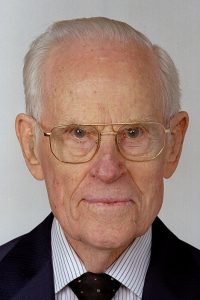Mission Bishop Promoted Indigenous Leaders

Ralph E. Dodge was an outspoken advocate for racial justice in Africa and the last white bishop of the United Methodist Church in Zimbabwe (Rhodesia) during that country’s colonial era.
Dodge’s 1956 election as a Methodist bishop for central and southern Africa marked the only time that an American Methodist missionary was elected bishop by the denomination in the colonial territories of Angola, Mozambique, Rhodesia (now Zimbabwe) and Zaire (now the Democratic Republic of Congo).
He led the church in Rhodesia for eight years before being expelled in 1964. He had long advocated for an inclusive church and representative rule in the white-minority-led country. The government of Prime Minister Ian Smith gave no reason for expelling him from the country. He was re-elected in exile and served another four years.
“The reason I was expelled,” he said in a 1997 story by United Methodist News Service, “was that I had written a book that criticized the church on racial matters and said the church should be preparing to take over or train (Indigenous) people to take over responsibilities. The assumption was that if the church could prepare people to take over, then why couldn’t the government do the same thing? There was the assumption that the time had come for a transfer of authority … and the government did not like this.”
In 1979, Bishop Abel T. Muzorewa, the first Black United Methodist bishop of Zimbabwe, asked for Dodge’s return to lead the church in Zimbabwe to enable Muzorewa to serve as his country’s first Black prime minister.
Muzorewa had served under Dodge as a young pastor. In his 1978 book, Rise Up and Walk, Muzorewa recalled his impressions of the bishop:
“In former years, missionaries and African church workers ate in separate dining rooms during church conferences, only joining together for worship and discussions. Saying nothing, Bishop and Mrs. Dodge merely went to eat with the African ministers and laymen. One day, the annual conference delegates were going to the dedication of a new church. Missionaries jumped into their cars while Africans boarded a hired bus. Many were embarrassed as the bishop boarded the bus with his African pastors.” Old patterns of segregation in the church were breaking down, Muzorewa wrote.
A native of Terril, Iowa, Dodge attended Taylor University in Upland, Indiana, and graduated with a Bachelor of Arts degree in 1931. He received a Master of Arts degree from Boston University in 1933 and a Bachelor of Sacred Theology degree in 1934. Shortly afterward, he married the former Eunice Davis of Little Valley, New York, in a home wedding.
Ordained a deacon in 1933 and an elder two years later, Dodge served briefly as a pastor in Mohall, North Dakota.
In 1936, the Dodges went to Angola to serve as missionaries. They were there until 1950, except for a four-year period during World War II, when travel restrictions prevented them from returning to Africa from a furlough. While stateside, Dodge served as a pastor in East Longmeadow, Massachusetts, and continued his studies at the Kennedy School of Missions in Hartford, Connecticut, where the couple had trained before going to Angola. He earned a Master of Sacred Theology degree in 1943 and a Doctor of Philosophy degree in 1944.
The Dodges returned to Africa in 1945, and in 1950, Ralph Dodge was asked to serve as secretary for Africa and Europe on the staff of the Methodist Church’s Board of Missions.
Dodge was elected a bishop by the Africa Central Conference in October 1956 and assigned to the Rhodesia Area. He led Methodists in what were then the countries of Southern Rhodesia, Angola, Mozambique, and South Africa. After his deportation in 1964, he continued leading the Rhodesia Area in exile, primarily from Zambia. He also was given interim responsibility for most of the church’s Geneva Area.
After retiring in 1968, he served as chaplain of the Mindolo Ecumenical Foundation in Kitwe, Zambia. The Dodges moved to Springfield, Missouri, in 1971, and retired in 1980 to the Advent Christian Village of Dowling Park, Florida. Two years later, Eunice Dodge died suddenly. The Dodges had four children, all raised in Africa. In late 1983, Bishop Dodge married Elizabeth Law. She died of a stroke in 1998.
In addition to his ministry career, Dodge wrote three books, The Unpopular Missionary, The Pagan Church, and The Revolutionary Bishop.
His career came full circle, in a sense, when he was recognized during the December 1997 centennial celebration of the church in Zimbabwe, held in Old Mutare.
“It’s nice to be back,” he said in a UMNS story. “To see the development of the church is amazing, and it’s gratifying.”
Adapted from obituary by Tim Tanton, United Methodist News Service, August 11, 2008




